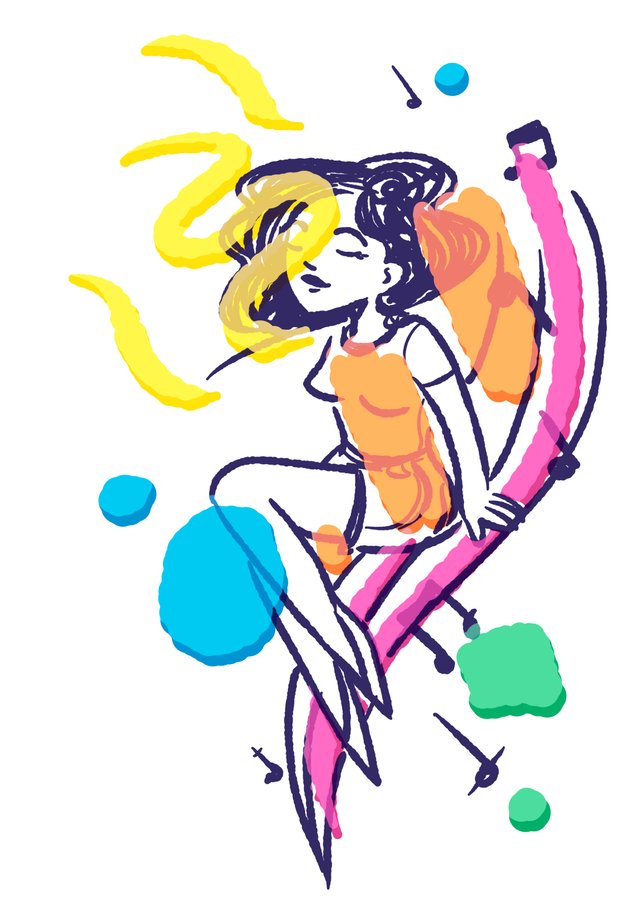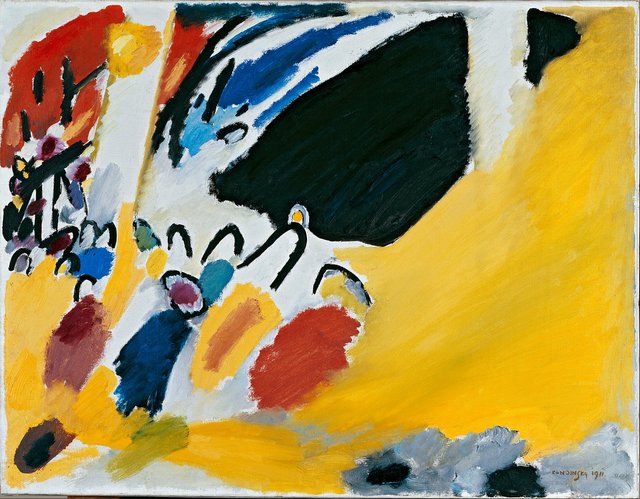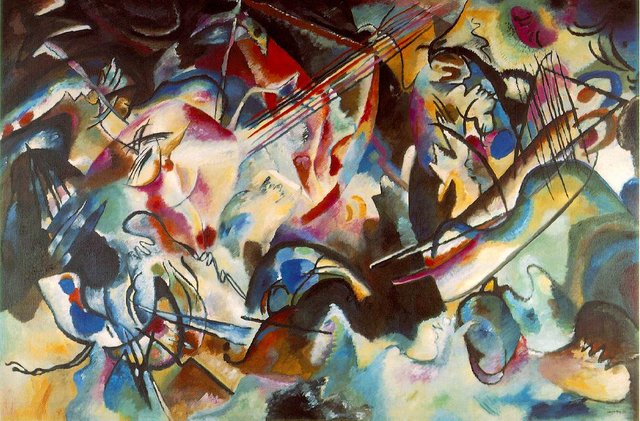Colori e Suoni - Colors and Sounds (Kandinsky)

Agli inizi XX secolo, si comincia a respirare un aria di innovazione e rivoluzione tra studiosi, intellettuali ed artisti. In questo nuovo clima, l’arte moderna ha come unico fine quello di comunicare pensieri, idee, emozioni attraverso un nuovo linguaggio visivo. In questo senso si mossero le Avanguardie storiche, elaborando un enorme patrimonio di idee e di concetti che cambiarono sensibilmente la visione del mondo dell’arte. Tra queste, produssero il singolare fenomeno di maggior novità del Novecento: l’Astrattismo. Avvenne tutto intorno tra il 1909 e il 1910.
In quegli anni prendono vita dalla mano di Kandinsky la serie delle Impressioni, Improvvisazioni e Composizioni.
In quegli anni prendono vita dalla mano di Kandinsky la serie delle Impressioni, Improvvisazioni e Composizioni.
At the beginning of the XX Century, we began to breathe an air of innovation and revolution among scholars, intellectuals and artists. In this new climate, modern art has the unique purpose of communicating thoughts, ideas and emotions through a new visual language. In this sense the historical avant-gardes moved, developing an enormous patrimony of ideas and concepts that significantly changed the vision of the art world. Among these, they produced the singular phenomenon of the greatest novelty of the twentieth century: Abstractionism. It happened all around between 1909 and 1910.
In those years the series of Impressions, Improvvisations and Compositions come to life from the hand of Kandinsky.
In those years the series of Impressions, Improvvisations and Compositions come to life from the hand of Kandinsky.

Wassily Kandinsky - Impression III (Concert) (Source Wikipedia)
La volontà di questi dipinti è comunicare contenuti e significati senza prendere in prestito nulla dalla realtà intorno a noi. Da qui, una domanda sorge spontanea: Com'è possibile comunicare determinate sensazioni ed emozioni reali se abbandoniamo le forme della realtà stessa?
Ovviamente, prendendo spunto dalla musica!
Non a caso, nel 1895 la sensibilità di Kandinsky fu scossa dall'ascolto del Lohengrin di Wagner. Durante l’esecuzione, ebbe l’impressione di veder passare davanti ai suoi occhi i toni e le sfumature fiabesche della sua Mosca, come dipinta dalle note dell’orchestra. Da questo momento inizia ad elaborare un nuovo linguaggio artistico, che culmina con lo scritto Lo spirituale nell'arte del 1912. In questo testo, la pittura arriva infatti a essere considerata una composizione vera e propria, ed attribuisce ad ogni colore un suono di uno strumento musicale, asseconda dell’emozione che suscita nello spettatore.
Ovviamente, prendendo spunto dalla musica!
Non a caso, nel 1895 la sensibilità di Kandinsky fu scossa dall'ascolto del Lohengrin di Wagner. Durante l’esecuzione, ebbe l’impressione di veder passare davanti ai suoi occhi i toni e le sfumature fiabesche della sua Mosca, come dipinta dalle note dell’orchestra. Da questo momento inizia ad elaborare un nuovo linguaggio artistico, che culmina con lo scritto Lo spirituale nell'arte del 1912. In questo testo, la pittura arriva infatti a essere considerata una composizione vera e propria, ed attribuisce ad ogni colore un suono di uno strumento musicale, asseconda dell’emozione che suscita nello spettatore.
The will of these paintings is to communicate contents and meanings without borrowing anything from the reality around us. From here, a question arises: How is it possible to communicate certain real sensations and emotions if we abandon the forms of reality itself?
Obviously, inspired by the music!
Not surprisingly, in 1895 the sensitivity of Kandinsky was shaken by listening to Wagner's Lohengrin. During the performance, he had the impression of seeing the tones and the fairy-like nuances of his Moscow pass before his eyes, as if painted by the notes of the orchestra. From this moment begins to elaborate a new artistic language, which culminates with the writing The spiritual in the art of 1912. In this text, painting comes to be considered a real composition, and gives each color a sound of one musical instrument, favors the emotion that arouses in the viewer.
Obviously, inspired by the music!
Not surprisingly, in 1895 the sensitivity of Kandinsky was shaken by listening to Wagner's Lohengrin. During the performance, he had the impression of seeing the tones and the fairy-like nuances of his Moscow pass before his eyes, as if painted by the notes of the orchestra. From this moment begins to elaborate a new artistic language, which culminates with the writing The spiritual in the art of 1912. In this text, painting comes to be considered a real composition, and gives each color a sound of one musical instrument, favors the emotion that arouses in the viewer.

Vassily Kandinsky, 1913 - Composition 6 (source Wikipedia)
Per esempio:
L’arancione esprime energia, movimento e viene paragonato al suono di una campana o di un contralto.
Il giallo comunica gioia e vitalità, viene paragonato al suono di una tromba, di una fanfara.
Il rosso è caldo e irrequieto ed è associato al suono di una tuba.
Il viola correlato al suono del corno inglese, alla zampogna e al fagotto, esprime solitudine, abbandono, mistero, magia.
L’azzurro, emotivamente freddo e tranquillo, è associato al suono di un flauto.
Il verde è il colore del riposo, equilibrio è paragonato ai suoni di un violino.
Un colore che sprofonda senza fine, il blu è associato alla calma e al suono del violoncello.
Il grigio e il marrone sono l’assenza di suono e movimento.
Il nero e il bianco sono silenzio, ma di due qualità ben diverse. Quello del nero è un silenzio di morte, invece quello del bianco è un silenzio pieno di possibilità.
Prendendo in considerazione uno spartito, questi colori possono essere associati alle pause musicali. Il bianco può essere associato alle pause all'interno del componimento, il nero è la pausa finale che indica la fine complessiva dell’esecuzione. Quello che sembra creare attraverso i suoi dipinti è un vero e proprio spartito cromatico di forme e colori, capace di far emozionare dello spettatore. “Il colore è un mezzo di esercitare sull’anima un’influenza diretta. Il colore è un tasto, l’occhio il martelletto che lo colpisce, l’anima lo strumento dalle mille corde” Questa visione dell’arte è ben espressa anche nei componimenti poetici del pittore.
Nel prossimo post analizzerò una poesia di Kandinsky che, secondo la mia personale ricerca, sitentizza ed esprime a pieno il suo pensiero.
Prendendo in considerazione uno spartito, questi colori possono essere associati alle pause musicali. Il bianco può essere associato alle pause all'interno del componimento, il nero è la pausa finale che indica la fine complessiva dell’esecuzione. Quello che sembra creare attraverso i suoi dipinti è un vero e proprio spartito cromatico di forme e colori, capace di far emozionare dello spettatore. “Il colore è un mezzo di esercitare sull’anima un’influenza diretta. Il colore è un tasto, l’occhio il martelletto che lo colpisce, l’anima lo strumento dalle mille corde” Questa visione dell’arte è ben espressa anche nei componimenti poetici del pittore.
Nel prossimo post analizzerò una poesia di Kandinsky che, secondo la mia personale ricerca, sitentizza ed esprime a pieno il suo pensiero.
For example:
Orange expresses energy, movement and is compared to the sound of a bell or a contralto.
The yellow communicates joy and vitality, is compared to the sound of a trumpet, a fanfare.
Red is warm and restless and is associated with the sound of a tuba.
The violet related to the sound of the English horn, the bagpipe and the bassoon, expresses solitude, abandonment, mystery, magic.
The light blue, emotionally cold and calm, is associated with the sound of a flute.
Green is the color of rest, balance is compared to the sounds of a violin.
A color that sinks endlessly, blue is associated with the calm and the sound of the cello.
Gray and brown are the absence of sound and movement.
Black and white are silence, but of two very different qualities. That of black is a silence of death, instead that of white is a silence full of possibilities.
Taking into consideration a score, these colors can be associated with musical pauses. White can be associated with pauses within the composition, black is the final pause that indicates the overall end of the performance. What he seems to create through his paintings is a real chromatic sheet of shapes and colors, able to excite the viewer. "Color is a means of exercising a direct influence on the soul. Color is a key, the eye the hammer striking it, the soul the instrument of a thousand strings "This vision of art is well expressed even in the poetic compositions of the painter.
In the next post I will analyze a poem by Kandinsky which, according to my personal research, shows and expresses its full thinking.
Taking into consideration a score, these colors can be associated with musical pauses. White can be associated with pauses within the composition, black is the final pause that indicates the overall end of the performance. What he seems to create through his paintings is a real chromatic sheet of shapes and colors, able to excite the viewer. "Color is a means of exercising a direct influence on the soul. Color is a key, the eye the hammer striking it, the soul the instrument of a thousand strings "This vision of art is well expressed even in the poetic compositions of the painter.
In the next post I will analyze a poem by Kandinsky which, according to my personal research, shows and expresses its full thinking.

Dear Artzonian, thanks for using the #ArtzOne hashtag. Your work is valuable to the @ArtzOne community. Quote of the week: Art, freedom and creativity will change society faster than politics. -Victor Pinchuk
Non sapevo tutte queste cose che bello, il disegno di apertura del post mi piace un sacco mi ricorda l'Incantevole Creamy, mio cartone preferito anni '80! Sei davvero brava!
grazie mille sono contenta che ti sia piaciuto l'articolo! Creamy l'adoravo anche io!! magari farò un post sui cartoni animati disegnati da me!! mi hai dato un idea!grazie :)
Quante notizie belle da apprendere!
Grazie di cuore paw <3 non vedevo l'ora di leggere il tuo commento visto che sei stata la prima a richiedermi questo argomento :)
Tutto molto interessante.
Grande Claudia, avanti anni luce, come sempre.
Grazie Nicola :) Io cerco solo di comunicare le cose che mi animano la mia creatività. Credo fortemente che le cose belle da condividere sono come dei cerchi concentrici. da un piccolo nucleo, si espandono per poi arrivare a tutti :)
Un post magistrale! Davvero complimenti! Non si finisce mai di imparare!
Grazie Dave :) è vero, non si finisce mai d'imparare. Ma credo che il segreto della creatività sia proprio questo, rinnovarsi sempre e scoprire nuove cose :)
Come al solito un lavoro impeccabile dove si percepisce la passione che metti in tutti i tuoi articoli. Complimenti e continua ad illuminarci così
grazie di cuore :) gentilissimo :)
Congratulations @claudiazazu! You have completed the following achievement on the Steem blockchain and have been rewarded with new badge(s) :
Click on the badge to view your Board of Honor.
If you no longer want to receive notifications, reply to this comment with the word
STOPDo not miss the last post from @steemitboard:
Hello @claudiazazu, thank you for sharing this creative work! We just stopped by to say that you've been upvoted by the @creativecrypto magazine. The Creative Crypto is all about art on the blockchain and learning from creatives like you. Looking forward to crossing paths again soon. Steem on!
Congratulations @claudiazazu! You have completed the following achievement on the Steem blockchain and have been rewarded with new badge(s) :
Click on the badge to view your Board of Honor.
If you no longer want to receive notifications, reply to this comment with the word
STOPDo not miss the last post from @steemitboard: